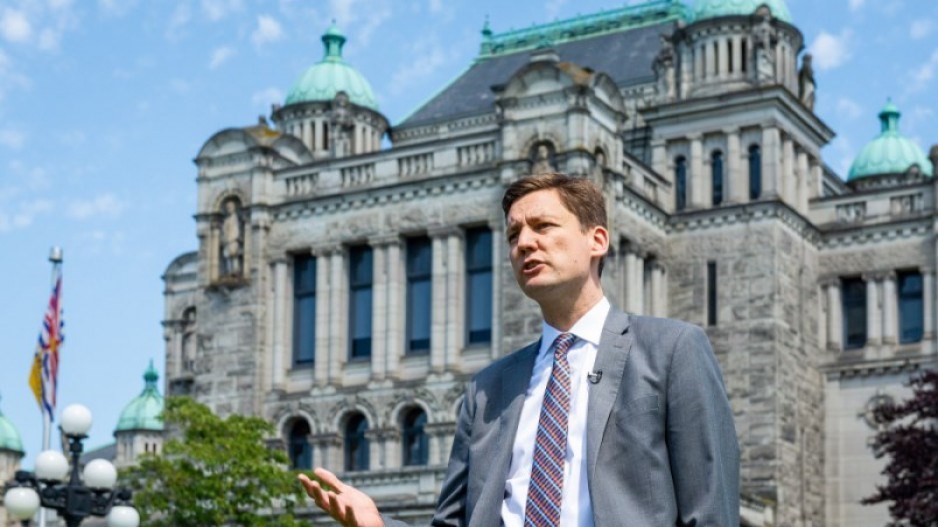Premier David Eby says he’ll make overseas trade missions an early priority of his premiership, restoring a presence in key markets that flagged under the John Horgan administration.
Eby intends to visit Asia (Korea, Vietnam and Japan) before this fall, having made the trip one of the first tasks of the new staff he appointed to his intergovernmental relations office.
“British Columbians will see me and our government travelling a fair bit to build our relationships,” the premier told OMNI News in a recent interview.
An initial part of that travel strategy, according to Eby, will be to target other Canadian provinces and Ottawa. The premier is headed to the capital this week for his first bilateral summit with Prime Minister Justin Trudeau. The two are expected to discuss health care (on the eve of Trudeau’s meeting with premiers on funding negotiations Feb. 7), homelessness, housing, bail reform and immigration – topics that are in many cases interrelated to the many crises the province is facing.
Later this year, it’s off to the United States, said Eby, where the continued softwood lumber dispute will be a priority, as will exploring how B.C.’s mines can feed the U.S. transition to batteries and a low-carbon future.
“Many industries in B.C., like our hydrogen industry, can feed into their goals and we can build trade that way,” Eby told OMNI.
“But we also know we’re a Pacific nation. We have a huge advantage. We have some of the largest ports in North America in our province. We have family and cultural ties to so many countries that are growing rapidly, whether it’s China, it’s Vietnam, it’s Korea, it’s India.”
China won’t actually be a destination for the premier, although at $8.8 billion in exports in 2021 it is the province’s second-largest trading partner, behind the United States, and a major destination for B.C.’s pulp and paper products, minerals and coal.
Relations between China and Canada remain strained, after the detention of Michael Spavor and Michael Kovrig in 2018 in retaliation for Canada detaining Huawei executive Meng Wanzhou on behalf of the United States. The country is not currently a destination stop for foreign leaders and dignitaries, in part because no one is quite sure about their safety.
The premier also earmarked India for a visit, to draw upon B.C.’s large Indo-Canadian demographic.
In total, the countries mentioned by the premier happen to dovetail quite nicely with the federal government’s Indo-Pacific strategy, which it launched last November with a focus on climate initiatives, trade and security in as many as 40 countries.
This region represents $47.19 trillion in economic activity, almost one-third of the globe’s population, almost half the planet’s gross domestic product and is home to six of Canada’s top 13 trading partners.
“We have huge advantages to go and speak to these communities and build those relationships,” said Eby, mentioning Richmond-Queensborough NDP MLA Aman Singh, a turban-wearing Sikh, lawyer and parliamentary secretary for the environment.
“You’ll see us doing trade missions to our usual partners but also trying to expand to new partners as well to help introduce B.C. businesses so we can extend the work they do and extend their global reach and our province’s growth. Because I think that’s where our economic growth and success will be.”
Coal is one of the province’s biggest exports, and is the top-purchased item in Korea and India. Copper ore is B.C. largest export to the ASEAN region, including Vietnam, and the second-largest in Korea and India as well.
Eby has just finished a round of natural resource-heavy announcements, including a speech to the Natural Resources Forum in Prince George, where he promised to support the industry, but also warned it must align with the clean-climate future and modern Indigenous reconciliation frameworks.
Will Eby’s international trade trips make a difference? It’s almost impossible to gauge – which is perhaps why premiers like these trips so much.
Governments of all stripes since Gordon Campbell’s Liberals have made the Asia-Pacific gateway, as it was once called, a staple of international economic planning.
Christy Clark conducted several trade missions as premier, including one to Malaysia to try and drum up support for the $40 billion LNG Canada project from global oil and gas giant Petronas.
New Democrats were often critical of the trade junkets in Opposition, tending to focus on things like the expense reports of the politicians involved and the questionable returns for the money spent.
But John Horgan did take a stab at his own junketeering, most often to Washington state, but once to Asia in 2018 where he visited China, Japan and South Korea to discuss tourism, forestry and mining, among other things.
Eby will be the first premier to visit Asia who speaks basic Mandarin. And he seems excited for the trip, as he related in his interview.
Whether it produces any results is perhaps beyond the point, as former premiers would attest. Simply going is part of the job of being head of the B.C. government.
Rob Shaw has spent more than 14 years covering B.C. politics, now reporting for CHEK News and writing for Glacier Media. He is the co-author of the national bestselling book A Matter of Confidence, and a regular guest on CBC Radio.




